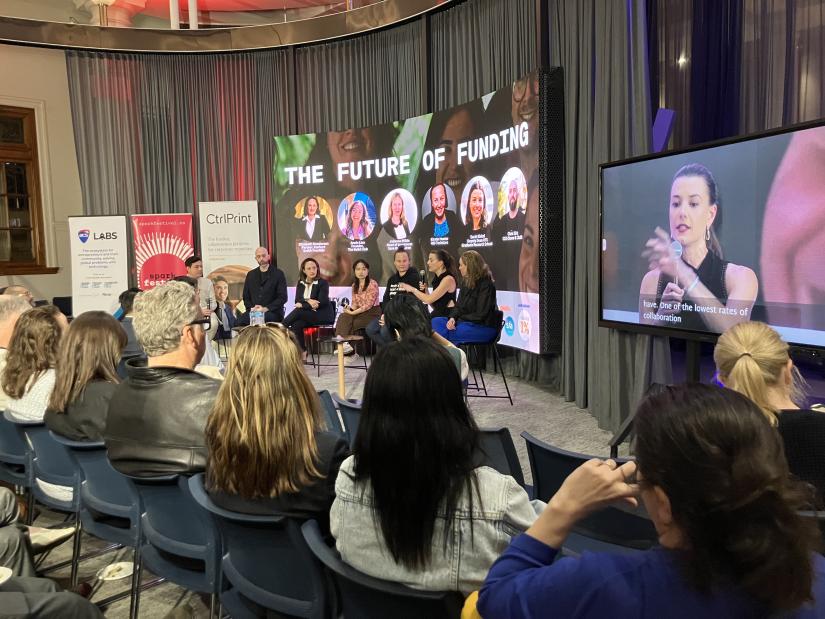At the launch of the 2024 Spark Festival on Monday 2 September 2024, A/Prof Sarah Kinkel, Deputy Dean of the UTS Graduate Research School, was part of a panel discussion in which she emphasised the fantastic research foundations here in Australia and the potential to develop a more entrepreneurial approach to taking IP developed in universities to market.
Sparking new pathways to entrepreneurship with a UTS PhD

A/Prof Sarah Kinkel, Deputy Dean of the UTS Graduate Research School, participating in a panel discussion during the opening event of the 2024 Spark Festival
“We have world class universities. We have a highly educated population. However, our competitive edge is not quite getting through into the innovation ecosystem,” Sarah said.
Despite our research capabilities, she is concerned that Australia continues to have one of the lowest rates of collaboration between businesses, government and the higher education sector in the OECD.
“This continuing shortfall has prolonged knock-on effects on our productivity and economic growth,” Sarah explained.
“The ingredients are here. The problems are here. If we think about climate change, net zero, batteries and climate tech, or when we think about aging populations and the need for health tech, these are global problems that are going to rely on research-driven solutions. The VC funding is here as well.”
The ingredients are here. The problems are here. If we think about climate change, net zero, batteries and climate tech, or when we think about aging populations and the need for health tech, these are global problems that are going to rely on research-driven solutions. The VC funding is here as well.
When thinking about potential solutions, Sarah spoke about the need for more diversified forms of support for research collaboration and building up capability.
“Entrepreneurs have very specific languages and cultures and ways of doing things, and so do academics. That’s why we’ve launched the UTS Entrepreneurial PhD program.”
The program seeks to build the pipeline of skilled, confident entrepreneurial-research collaborators.
“The idea is that you come in with your own business and we work with you over three years of really rigorous, dedicated mentorship from a panel of experts.”
With the Entrepreneurial PhD, candidates get access to the UTS Startups community, advanced research facilities and expert knowledge that isn't always publicly accessible. The program is customised to each participant, focused on supporting them to develop an innovation that has quality, durability, scale and evidence to back it up.
Sarah said that the initiative is quite different to a traditional PhD.
“This opportunity is about taking cutting-edge knowledge and putting it into innovative ventures, preparing businesses and founders for future funding opportunities,” she said.
This opportunity is about taking cutting-edge knowledge and putting it into innovative ventures, preparing businesses and founders for future funding opportunities.
With UTS committed to building the kinds of capabilities entrepreneurs need to take research collaborations into global markets, programs such as the Entrepreneurial PhD are creating a more permeable boundary between universities and the knowledge they can create.
“We need more of those talented entrepreneurs that are so good at actually bringing proven research ideas and inventions into the market,” said Sarah adding that many PhD researchers at UTS report that combining decades of professional experience with research has made their businesses better and given them additional confidence.
“If you do an Entrepreneurial PhD with us, you’ll gain confidence, credibility and rigorous data to talk about with customers. These additional credentials can provide legitimacy to your business and mark you out as a global expert in your own right.”
Learn more about the UTS Entrepreneurial PhD at www.gradresearch.uts.edu.au.